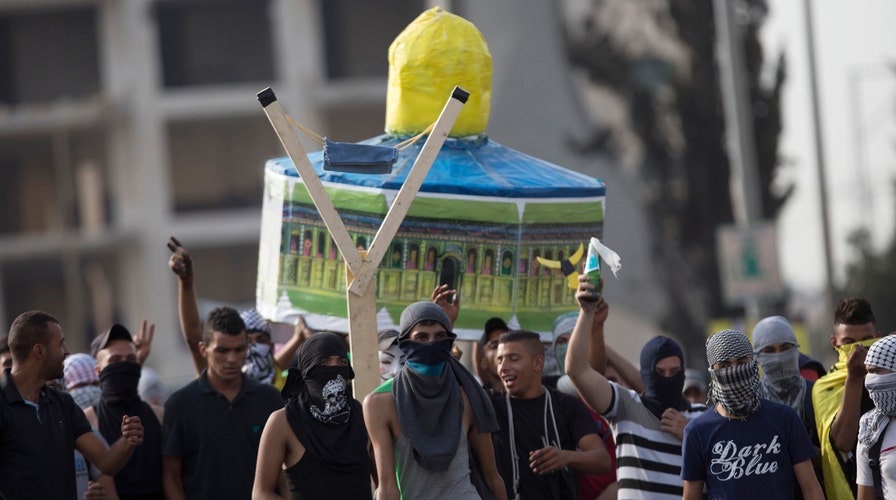Israeli and Palestinian leaders call for calm
Israeli police: 4 stabbing attacks by Palestinians
Israeli Prime Minister Benjamin Netanyahu – facing increasing pressure from the public over his handling of a wave of Palestinian attacks – said Tuesday that his government is working on a series of “aggressive steps” to combat the crisis.
Netanyahu left a gathering of senior security officials to give the speech to parliament, then returned to the security discussions.
"We will use and not hesitate to use all means at our disposal to restore calm," he said. "I'm sure the steps we will take will let the other side know that terror doesn't pay."
The comments come as Netanyahu is seeing his support fading with the public. An opinion poll released this week showed that more than 70 percent of Israel is dissatisfied with his handling of the attacks, according to The Associated Press. Some eight Israelis and 27 Palestinians have died in a month of Israeli-Palestinian unrest.
Earlier Tuesday, Israeli police said a Jewish Israeli man stabbed another Jewish man in a suspected failed revenge attack.
A police spokesman initially called the stabbing a criminally motivated attack. Later, police said they concluded the man was hoping to stab an Arab in revenge for the wave of violent attacks against Jews that has spread across Israel.
However, he attacked another Israeli Jew whom he thought was an Arab because of his Middle Eastern appearance.
The 22-year-old victim was moderately wounded.
Also Tuesday, at least three Israelis were killed and 20 others were wounded in Jerusalem.
The U.S. State Department condemned the attacks. Spokesperson John Kirby added, "We mourn any loss of innocent life, Israeli or Palestinian."
Police spokesman Micky Rosenfeld told the Associated Press two attackers stabbed and shot people on a bus before one of the attackers was killed and the other was captured. Two people were killed in the attack. Israeli media, citing police, reported that 16 others were wounded.
The Jerusalem Post reported that the bus attack took place in the Armon Hanatziv neighborhood in the southern part of Jerusalem. The paper said one of the deceased victims as a 60-year-old man, but had no further details. Four of the wounded were taken to hospitals, one with serious injuries and three others with moderate injuries.
Almost simultaneously, another attack at a bus stop in another part of the city killed at least one person before the attacker was shot and killed by police. The Jerusalem Post also reported that the perpetrator of the bus station attack rammed his car into the bus stop before getting out and stabbing pedestrians. In addition to the deceased victim, police said three others were wounded in that attack.
Police closed major highways leading in and out of Jerusalem, while Netanyahu called an emergency meeting of his Security Cabinet, where police were to present a plan to halt the violence. Police spokeswoman Luba Samri said the country's internal security minister, Gilad Erdan, was considering a number of immediate steps, including a closure on Arab neighborhoods in east Jerusalem, where many of the attackers have come from, and making it easier to get gun licenses.
At the scene of one of the attacks, Jerusalem Mayor Nir Barkat called on the government to seal off the West Bank and certain Arab neighborhoods of east Jerusalem to quell the wave of attacks that have struck the city.
Earlier Tuesday, Rosenfeld said a Palestinian man from east Jerusalem stabbed another man waiting at a bus stop on the main thoroughfare of Raanana, a quiet city north of Tel Aviv. The Israeli was moderately wounded and the attacker was apprehended and beaten by local residents before he was taken to a hospital.
Since the Jewish New Year last month, at least 27 Palestinians been killed by Israeli fire, including 11 identified by Israel as attackers and the rest in clashes between stone-throwers and Israeli troops.
The unrest began last month with clashes at Jerusalem's most sensitive holy site and quickly spread across Israel and into the West Bank and Gaza Strip.
The attackers, many of them teenagers, have had no affiliation with militant groups, and the seemingly random nature of the stabbings has made it difficult to predict or prevent them. The use of vehicles and firearms in Jerusalem on Tuesday, however, marked a more serious level of violence and bring back memories of the deadly attacks that plagued Israeli cities during last decade's second Palestinian uprising.
The Associated Press contributed to this report.

